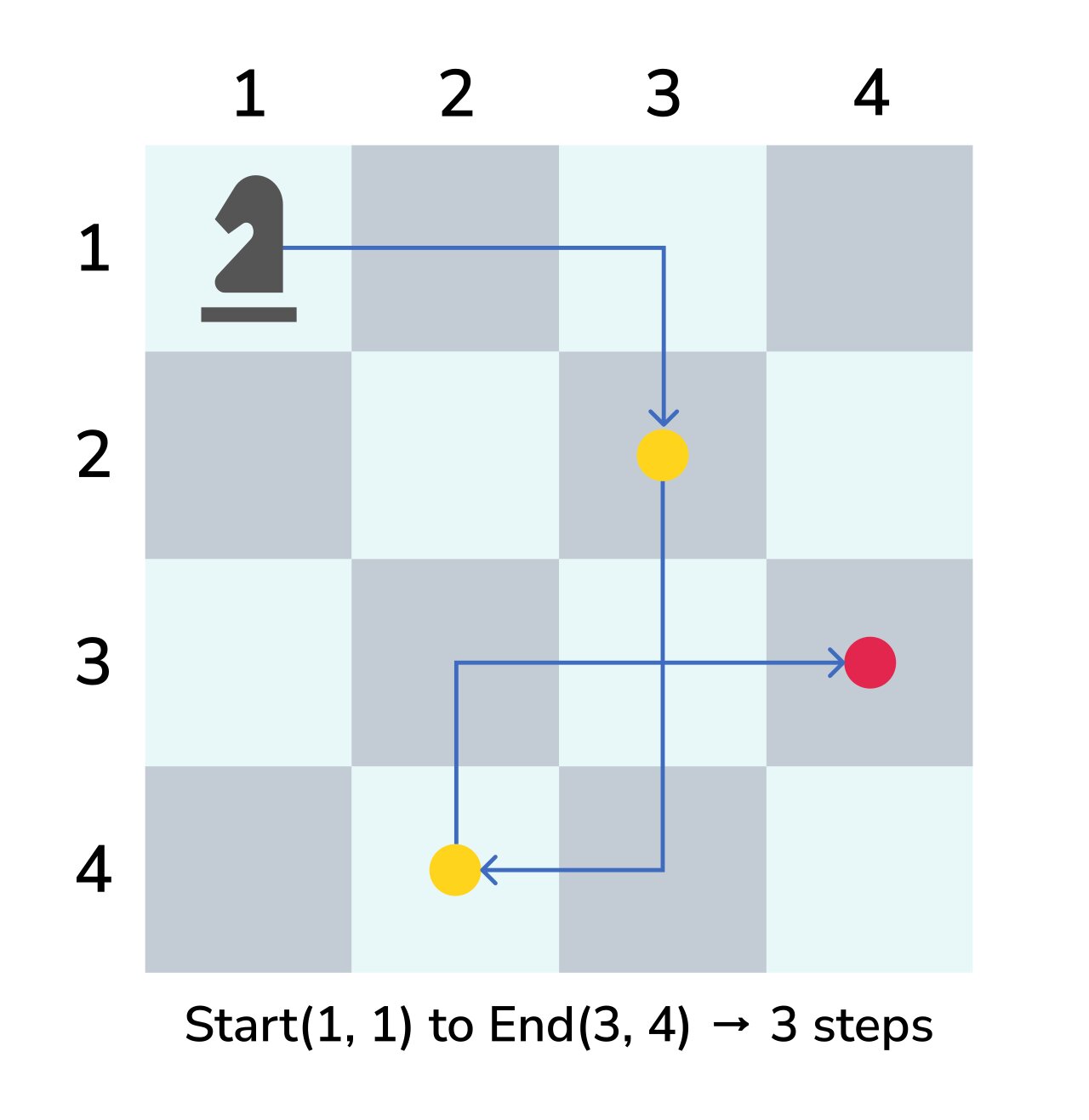Knight's Journey On A Chessboard
Back to home
- Problem Statement: Knight's Journey On A Chessboard
- Approach: Using BFS
𝑻𝒂𝒃𝒍𝒆 𝒐𝒇 𝑪𝒐𝒏𝒕𝒆𝒏𝒕
 Logicmojo - Updated Aug 28, 2021
Logicmojo - Updated Aug 28, 2021
Problem Statement: Knight's Journey On A Chessboard
You have a chessboard of size n*n. A knight sits on the board at a position start(x, y). The knight wants to go to another cell end(x, y). Find the minimum number of moves required to go from the start position to the end position. If this is not possible, return -1.

Example: N = 30, knightpos = [1, 1], targetpos = [30, 30]
Output: 20
Approach: Using BFS
This problem can be seen as shortest path in unweighted graph. Therefore we use BFS to solve this problem. We try all 8 possible positions where a Knight can reach from its position. If reachable position is not already visited and is inside the board, we push this state into queue with distance 1 more than its parent state. Finally we return distance of target position, when it gets pop out from queue.
C++ Implementation:
#include <bits/stdc++.h> using namespace std; // structure for storing a cell's data struct cell { int x, y; int dis; cell() {} cell(int x, int y, int dis) : x(x), y(y), dis(dis) { } }; bool isInside(int x, int y, int N) { if (x >= 1 && x <= N && y >= 1 && y <= N) return true; return false; } int minStepToReachTarget( int knightPos[], int targetPos[], int N) { // x and y direction, where a knight can move int dx[] = { -2, -1, 1, 2, -2, -1, 1, 2 }; int dy[] = { -1, -2, -2, -1, 1, 2, 2, 1 }; q.push(cell(knightPos[0], knightPos[1], 0)); cell t; int x, y; bool visit[N + 1][N + 1]; for (int i = 1; i <= N; i++) for (int j = 1; j <= N; j++) visit[i][j] = false; visit[knightPos[0]][knightPos[1]] = true; while (!q.empty()) { t = q.front(); q.pop(); if (t.x == targetPos[0] && t.y == targetPos[1]) return t.dis; // loop for all reachable states for (int i = 0; i < 8; i++) { x = t.x + dx[i]; y = t.y + dy[i]; if (isInside(x, y, N) && !visit[x][y]) { visit[x][y] = true; q.push(cell(x, y, t.dis + 1)); } } } } // Driver code to test above methods int main() { int N = 30; int knightPos[] = { 1, 1 }; int targetPos[] = { 30, 30 }; cout << minStepToReachTarget(knightPos, targetPos, N); return 0; }
Python Implementation:
from collections import deque def mini_step(knightpos, targetpos): queue = deque([[knightpos[0], knightpos[1], 0]]) seen = set() seen.add((knightpos[0], knightpos[1])) while queue: i, j, dist = queue.popleft() if i == targetpos[0] and j == targetpos[1]: return dist for k in range(8): x, y = i + X[k], j + Y[k] if 1 <= x <= n and 1 <= y <= n and (x, y) not in seen: queue.append((x, y, dist + 1)) seen.add((x, y)) knightpos = [1,1] targetpos = [30,30] X = [2, 2, -2, -2, 1, 1, -1, -1] Y = [1, -1, 1, -1, 2, -2, 2, -2] n = 30 print(mini_step(knightpos, targetpos))
Time Complexity: O(N2) At worst case, all the cells will be visited so time complexity is O(N2).
Space Complexity: O(N2). The nodes are stored in queue. So the space Complexity is O(N2).
With this article at Logicmojo, you must have the complete idea of solving Knight's Journey On A Chessboard problem.